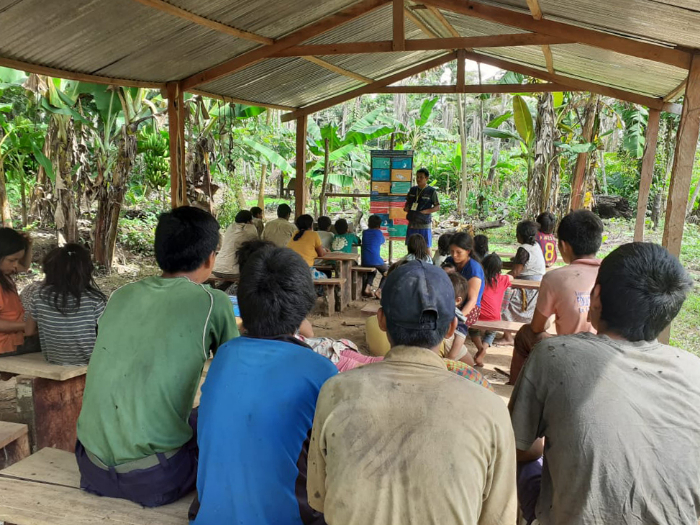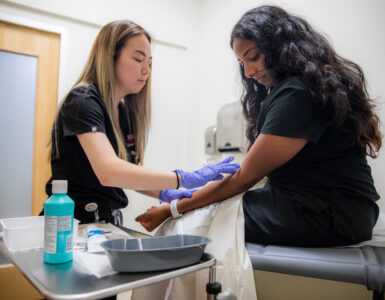Chapman University scientist Hillard Kaplan‘s latest research in the Indigenous communities of Bolivia’s tropical forests offers insight into healthy habits that could improve our brain and cardiovascular health and reduce the risk of disease.
Kaplan is the lead writer of the research article, “Brain volume, energy balance, and cardiovascular health in two nonindustrial South American populations” published March 20 in Proceedings of the National Academy of Sciences.
Some of the lowest rates of heart and brain disease ever reported by science are found among the Tsimané and Mosetén communities of Bolivia. This new research by Chapman University and USC scientists on two of these societies, suggests that optimal levels of food consumption and exercise maximize healthy brain aging.
Kaplan has led a research team of dozens for more than two decades gathering breakthrough health and history data, including studies of low rates of dementia among the Indigenous villagers in the Bolivian rainforest and received a Lifetime Achievement Award from the Human Behavior and Evolution Society in 2021. He is a professor of health economics and anthropology and teaches in Chapman’s Argyros School of Business and Economics and the School of Pharmacy.
“The latest research implies that there are ‘sweet spots’ of food consumption, exercise, and even exposures to pathogens for maximizing health, well-being and cognitive function,” Kaplan said. It also highlights that people living in societies with abundant food and little requirement for physical activity often face a conflict between what they consciously know is best for them and the cravings that come from our evolutionary past, he said.
To better understand the tipping point where abundance and ease begin to undermine health, the researchers studied 1,165 Tsimané and Mosetén adults, aged 40-94 years, and provided transportation for participants from their remote villages to the closest hospital with CT scanning equipment.
The team used CT scans to measure brain volume by age. They also measured participants’ body mass index, blood pressure, total cholesterol and other markers of energy and overall health.
The researchers found that the Tsimané and Mosetén experience less brain atrophy and improved cardiovascular health compared to industrialized populations in the United States and Europe. Rates of age-related brain atrophy, or brain shrinking, are correlated with risks of degenerative diseases like dementia and Alzheimer’s.
“The lives of our pre-industrial ancestors were punctured by limited food availability,” said Andrei Irimia, an assistant professor of gerontology, biomedical engineering, quantitative/computational biology and neuroscience at the USC Leonard Davis School of Gerontology and co-corresponding author of the study. “Humans historically spent a lot of time exercising out of necessity to find food, and their brain aging profiles reflected this lifestyle.”
Kaplan said with additional funding expected, the scientists plan to conduct a second round of CT scans seven years after the first to measure individual rates of brain volume change longitudinally. “Because the lifestyles of many Tsimané and Mosetén are transitioning toward a more Western lifestyle, we will investigate both the factors associated with individual differences in lifestyle change and also, the impacts of those changes on health outcomes, such as diabetes, heart disease, brain volume, and dementia,” he added.
About Chapman University
Founded in 1861, Chapman University is a nationally ranked private university located in Southern California. Chapman is categorized by the Carnegie Classification as an R2 “high research activity” institution and offers personalized education to more than 10,000 undergraduate and graduate students. The campus has produced a Rhodes Scholar, been named a top producer of Fulbright Scholars, and hosts a chapter of Phi Beta Kappa, the nation’s oldest and most prestigious honor society. Based in the city of Orange, Chapman also includes the Harry and Diane Rinker Health Science Campus in Irvine. In 2019, the university opened its 11th college, Fowler School of Engineering, in its newest facility, Keck Center for Science and Engineering. Learn more about Chapman University: www.chapman.edu.
###
Media Contact:
Cerise Valenzuela Metzger, Director of Public Relations, cmetzger@chapman.edu
Desk: 714-289-3143 Mobile: 657-390-6760




